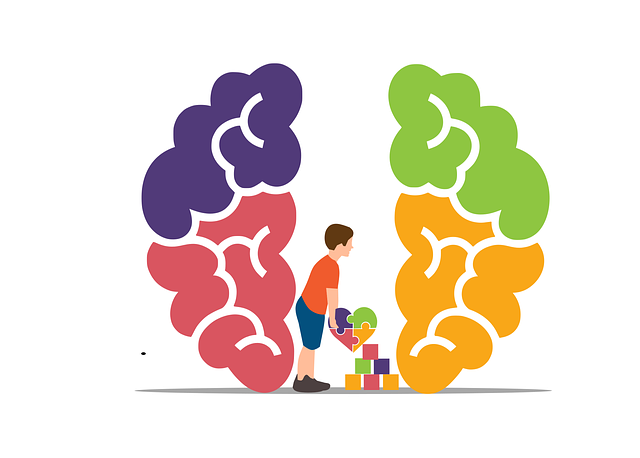Colorado Springs Conduct Disorder Therapy leverages the RFM (Recovery, Flexibility, Mastery) framework to build resilience in young individuals through structured programs focusing on healing trauma, cultivating mental agility and empowering self-control. Incorporating techniques like Depression Prevention, Stress Reduction, and Mindfulness Meditation, these programs enhance mental fortitude using interactive activities based on real-world scenarios, transforming challenges into growth opportunities. The RFM model, including the Strengths, Weaknesses, Motivations (SWM) approach, allows therapists to tailor interventions for specific needs, such as Social Skills Training, leading to improved emotional regulation and well-being, as measured by anxiety relief and stress management improvements.
In the heart of Colorado Springs, addressing conduct disorder among youth has become a paramount concern. This article delves into the transformative potential of RFM (Resilience, Flexibility, and Mastery), a robust framework for resilience building. We explore its role in Colorado Springs conduct disorder therapy, offering practical insights on designing effective exercises tailored to the unique needs of young individuals. Through strategic implementation in therapeutic settings, RFM promises to enhance coping skills and foster overall well-being. Discover how these programs measure success and their profound impact on youth development.
- Understanding RFM and Its Role in Resilience Building
- Identifying Conduct Disorder and Its Impact on Youth
- Designing Effective Resilience Exercises for Colorado Springs Therapy
- Implementing RFM Strategies in a Therapeutic Setting
- Measuring Success: Evaluating the Effectiveness of RFM Programs
Understanding RFM and Its Role in Resilience Building

Resilience is a critical component of mental well-being, enabling individuals to navigate life’s challenges and setbacks with adaptability and bounce back strength. This is where RFM (Recovery, Flexibility, and Mastery) steps in as a powerful framework for building resilience, particularly relevant in contexts like Colorado Springs Conduct Disorder Therapy. By focusing on these three core aspects, RFM offers a structured approach to enhancing an individual’s ability to cope with stress and adversity.
Recovery in the RFM model emphasizes healing from past traumas or stressors, addressing underlying issues that may hinder resilience. Flexibility involves cultivating mental and emotional agility, enabling individuals to adapt to changing circumstances without becoming overwhelmed. Mastery, the final pillar, encourages taking control and developing skills to manage challenges effectively. This holistic approach, incorporating strategies such as Depression Prevention, Stress Reduction Methods, and Mindfulness Meditation, empowers individuals to build a strong psychological foundation, fostering resilience that can be applied across various aspects of life.
Identifying Conduct Disorder and Its Impact on Youth

Conduct Disorder, often diagnosed in youth, is a serious behavioral and emotional disorder that can significantly impact a young person’s life. This condition manifests as repeated and persistent patterns of aggressive behavior, violating the rights of others or societal norms. In Colorado Springs, Conduct Disorder Therapy plays a pivotal role in identifying and addressing this issue. Without proper intervention, it can lead to academic difficulties, problems with authority figures, and strained relationships, both within the family and community.
The impact extends beyond the individual, affecting families and society at large. Youth with Conduct Disorder may struggle with low self-esteem, making them susceptible to peer pressure and potentially engaging in high-risk behaviors. Effective therapy focuses on coping skills development and conflict resolution techniques to help young individuals manage their emotions and interact positively with others. Through structured programs, youth can learn self-esteem improvement strategies, enabling them to build resilience and navigate challenges more effectively.
Designing Effective Resilience Exercises for Colorado Springs Therapy

In Colorado Springs conduct disorder therapy, designing effective resilience exercises is paramount to fostering a strong therapeutic foundation. These exercises should be tailored to address the unique challenges faced by individuals struggling with conduct issues, incorporating Mind Over Matter principles to empower them with coping strategies that promote mental fortitude. By focusing on skills like stress management, emotional regulation, and problem-solving, therapists can help clients build resilience against adversity, preventing burnout and depression in the long term.
Resilience exercises should be interactive and engaging, encouraging active participation from the client. Incorporating real-world scenarios and practical activities allows individuals to apply learned techniques directly to their lives. This approach not only reinforces positive behaviors but also instills a sense of agency and self-efficacy, crucial elements in strengthening one’s resilience. Through careful design, these exercises can transform challenges into opportunities for growth, equipping Colorado Springs conduct disorder therapy clients with the tools needed to navigate life’s storms with grace and determination.
Implementing RFM Strategies in a Therapeutic Setting

In a therapeutic setting, particularly for addressing conduct disorder in Colorado Springs, implementing RFM (Strengths, Weaknesses, and Motivations) strategies offers a structured framework for understanding and supporting individuals’ resilience. This approach encourages therapists to delve into each client’s unique experiences, strengths, and challenges. By identifying weaknesses and exploring motivators, therapists can tailor interventions that foster growth. For instance, Social Skills Training can be incorporated to enhance communication and empathy-building strategies, addressing potential gaps in social interactions.
The RFM model aligns with Mind Over Matter principles, empowering individuals to take control of their emotional responses and behaviors. Through this process, clients learn to navigate triggers effectively, redirect negative impulses, and cultivate positive coping mechanisms. Such exercises not only contribute to building resilience but also promote self-awareness, a crucial aspect in managing conduct disorder symptoms.
Measuring Success: Evaluating the Effectiveness of RFM Programs

Measuring success is a vital component of any effective program, especially when addressing complex issues like conduct disorder. In the context of Colorado Springs conduct disorder therapy, evaluating the RFM (Resilience, Flexibility, and Mindfulness) programs’ impact involves assessing changes in participants’ behavior, emotional regulation, and overall well-being. This process is crucial for ensuring that the therapy aligns with its goals and provides tangible benefits.
One way to gauge success is by tracking improvements in anxiety relief and stress management workshops among participants. As they learn mindfulness techniques and develop emotional intelligence, their ability to cope with challenging situations should improve. Through regular assessments and feedback from both clients and therapists, the organization can identify what aspects of the RFM programs are most beneficial and make necessary adjustments to maximize positive outcomes.
Resilience is a powerful tool for youth facing challenges like conduct disorder. Implementing RFM (Resource, Strengths, and Coping) strategies in Colorado Springs conduct disorder therapy has shown promising results in enhancing emotional regulation and fostering adaptability. By combining targeted exercises with an understanding of individual needs, therapists can create personalized programs that build resilience. Continuous evaluation ensures these programs remain effective, ultimately empowering young individuals to navigate life’s difficulties with greater ease. For those seeking Colorado Springs conduct disorder therapy, integrating RFM into treatment offers a comprehensive approach to nurturing resilience and long-term well-being.













